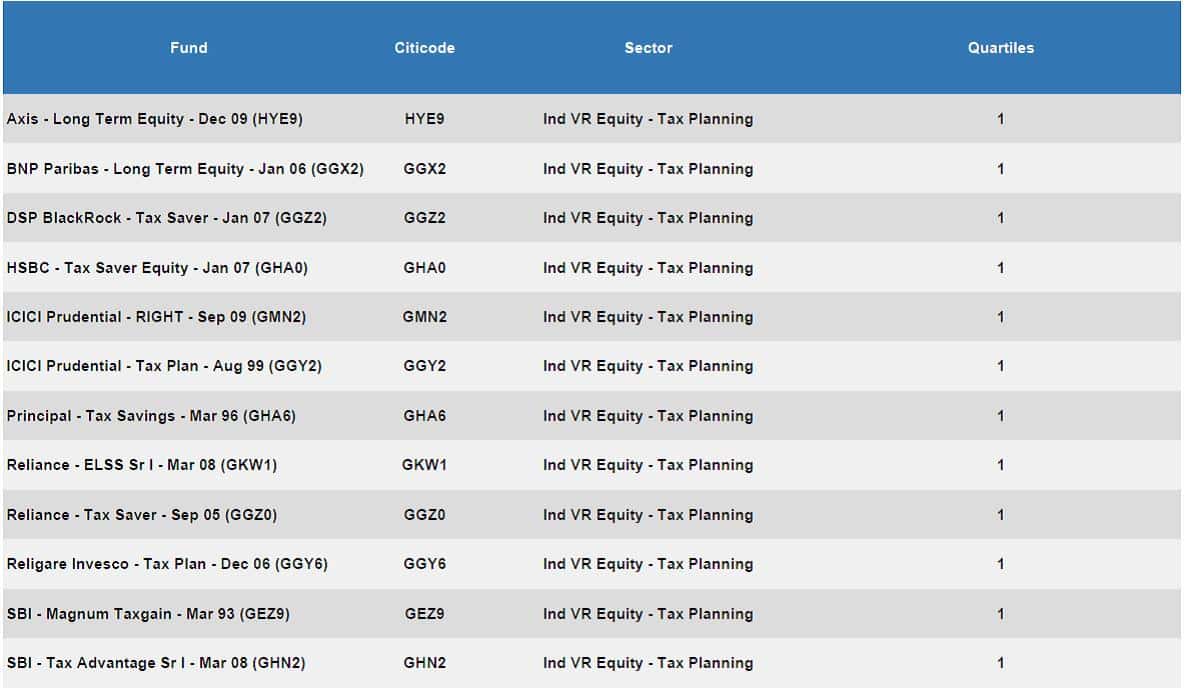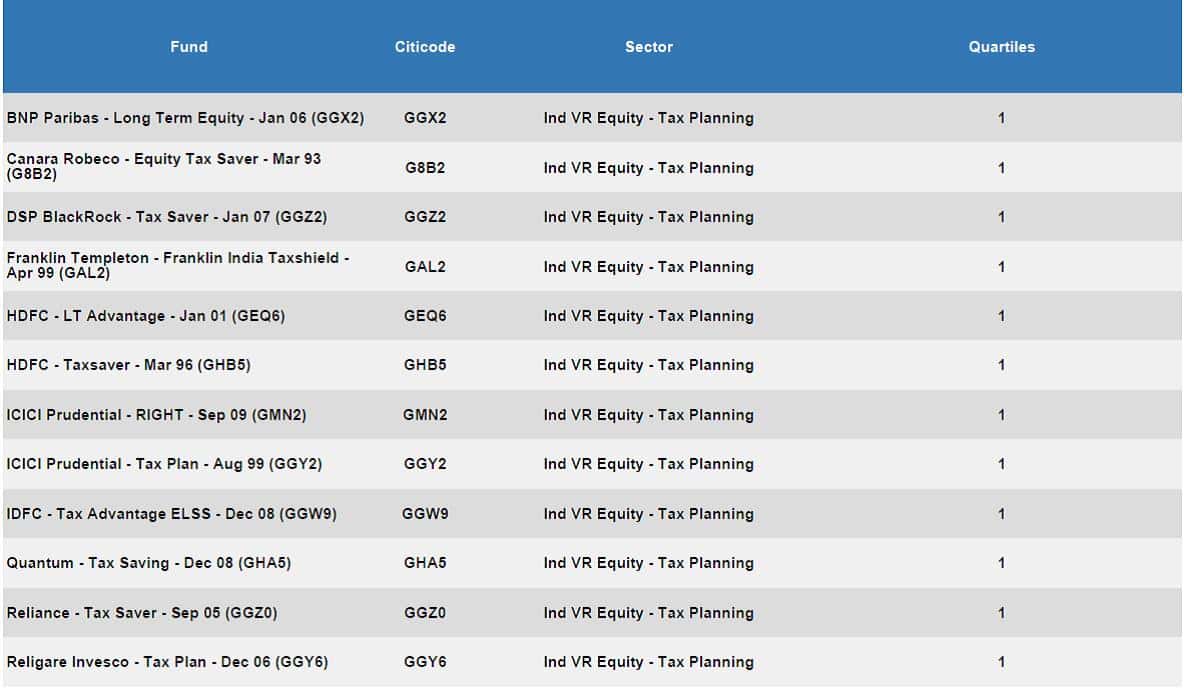Last year I wrote a detailed article on best elss tax saving mutual funds to invest in 2013 with reference to parameters i shared on my Money control article.
This today’s article is a kind of review of the earlier one, based on the same parameters with some fine tuning. Before going ahead, I would like to reiterate that there’s nothing that can be called as best. It’s just if it suits your risk profile and can provide you with decent, above average returns…it is a best elss fund for you.
Parameters to select best elss tax saving mutual funds for FY 2014 – 15
- Fund should be in top quartile i.e among the top 25% of the funds in the same category, for last 3 years. You may chose it for 5 or more years too. The longer term you select, better it is.
- Fund should have generated ALPHA with reference to its benchmark. Alpha is the extra return fund has generated as compared to its benchmark or anything you want to compare it with.
- Check out the expense ratio of the funds.
You may be ready to compromise high expense ratio to fund’s performance. But still cost of investment do affect fund’s returns.
- Fund manager Tenure. As we are considering all parameters to be above 3 years, so better to go with fund which is being managed by same fund manager for at least the same tenure.
- AUM of the fund.
All the parameters mentioned above are quantitative in nature. Those who deal with and follow the Asset management companies closely may also get to know about the qualitative features of these companies which are also important to zero on to a particular fund. Ethics, Philosophy, aggressive or conservative management etc. are some of the qualitative factors which are also important to know and your personal advisor may take you through those.
So let’s filter out the ELSS tax saving mutual funds as per the parameters mentioned above .
ELSS tax saving mutual funds which are in quartile 1 in last 3 years, are as under
ELSS tax saving mutual funds which are in quartile 1 in last 5 years
The common funds between 3 and 5 years time frame, in quartile 1 are
Quartile rankings tell the consistency of the returns. ELSS funds come under equity category and thus should be treated as normal equity fund meant for long term allocation. 3 years is the normal lock in period in these funds, but one should also look at 5 or more years return or quartile ranking too before further filtering.
I will be taking funds which are in quartile 1 in 3 and 5 year time frame, to find out best elss tax saving mutual funds to invest in FY 2014-15
Now, let’s find out how well the fund manager has performed, as in how much extra return it has generated as compared to its respective benchmark. We need to look at the alpha that fund has generated. Here I have further filtered the above list with alpha greater than or equal to 1
The above filtering has thrown BNP Paribas long term equity fund out of list, but this is a software issue and the fund is as good as others for your consideration.
I have furthered filtered the funds above to check, with which fund, same fund manager has actually been working for 3 years or more. This is to check if the fund’s alpha is due to the current fund manager’s management
Further selection of funds can be based on the total expense ratio and AUM of the fund house. Higher AUM is better as it leads to low expense ratio and also checks the concentration of fund into few investors.
So we have 3 winners here in the category of best elss tax saving funds 2014.
But as I said that you should treat ELSS funds investments like any other equity investment, and should apply this test to long term quartile performance also. Sometimes 3 years performance may dodge you for long term investment
Best elss tax saving mutual funds to invest in 2014-15 by applying the above filtering to 5 years performance
Best elss tax saving mutual funds to invest in 2014-15 by applying the above filtering to 10 years performance
Data Source : FE Analytics Valueexpress dt 3 Nov’2014
Conclusion:
You can clearly see the presence of some funds at all levels of filtering. A solid short term performance can definitely change the long term track record, and that performance can be due to some of the stocks which have suddenly zoomed in recent years. This strategy can be risky for a moderate to conservative investor. You should select your best elss tax saving mutual funds for FY 2014-15 keeping in mind your personal risk profile and also fund’s risk return parameters. The investment should support in your long term goal achievement.
Hope the above exercise helps you in selecting your best elss tax saving fund for FY 2014-15.
Any questions? Feel free to ask in Comments section below.
( Do you want to have Fundtastic investment portfolio ?- Click here)














Thanks for this useful article manikaran. I was just searching for the same as i have to put my this years tax saving money.
Thanks Surabhi. i am glad that you find it useful
Sir, i have just joined an MNC and this is my first Job. I need to invest for my tax saving. Do you suggest i should go with Elss funds which ofcourse is one of the option and your suggestions will help a lot, or there are other options too which i should consider.
I want to invest Rs 1 lakh which i guess is the maximum limit to invest
Rohan, ELSS funds are one of the options to save u/s 80C of income tax act. Your EPF, PPF, Insurance premiums, 5 years bank FD etc. are some of the other options. I think you should divide your tax saving into different products. As your EPF and PPF generates tax free returns, so you should open one PPF a/c too. Invest in ELSS not only for tax saving but to save for your long term goal. This is the right time you should develop your savings habit which will last long.
By the way, in FY 14-15 section 80C limits has been enhanced to 1.50 lakh. So enjoy saving more.
good information. Thanks
Thanks for liking it, suresh.
Hi Manikaran,
I am planning to invest in SBI Magnum tax saving fund, what are your suggestions on it?
Hi Eswar.
Magnum tax gain is a good fund looking at very long term parameters. It used to be one of the top 3 funds in performance few years back. But it is not as consistent as other funds of this category. I would advise you to avoid and go with franklin, HDFC or icici
How about Canara Robeco?
Hi Manikaran,
I have plans to go for ELSS but took backstep because now markets are in upside.Actually what i felt is i should start investing on this when it goes down so that i can be in safe side.
What do you suggest on this? Will there be difference?
Mr Chandra
If you an investor, then you should not be worried about the market. Moreover, i don’t know what is high and low of markets. Sensex of 21k was not considered high in 2007 but everyone was ready to invest at that time and when sensex was around 8k after few months then no one was ready to invest.
If you feel that market will not go up in future or you will be able to invest in the down trend and know when it is going to come, which i think no one can, the you may wait to invest.
I am not a fund manager or expert in stocks, but i can see some stocks which are not moving along with market index. Some are way high and some are way low. Its all in fund manager expertise now, how they can find out suitable stocks for there funds.
You should invest as per your risk tolerance level and follow asset allocation approach. I advise you stop timing the markets , better to focus on goals and depending on that select your products.
Hello Manikaran,
Why Axis Long term equity fund of ELSS Category is ignored?
I called up Franklin Templeton they directed me to Advisor what difference it makes without advisor?
Chandra, Axis long term equity has not yet completed 5 years . and in my filtering I’ve taken funds which are in quartile 1 in 3 and 5 year time frame. Axis fund appeared in 3 years quartile ranking but could not appear in 5 years due to its age.
and regarding your second question, the difference of going with advisor and without advisor is the difference in the expense ratio, which is being paid to the adviser by the mutual fund house for his services rendered to you.
Thank you for the simple, lucid and well-contented analysis and conclusions. Pl detail me what is AUM and ALPHA
Thanks for your appreciation Varadaraju. Do share this with your friends too.
AUM stands for Assets Under Management. This is the total amount of investment that the particular fund currently has.
ALPHA is the extra return that the fund manager generates under his active management as compared to the benchmark. For e.g if the benchmark generates 15% annual of return and fund manger 17%, then the fund has generated alpha of 2%. Higher the alpha better is the fund manager’s performance
Hi,
I am planning to invest in Axis long term equity fund. Any suggestions on it?
It is a good fund…you may go with it.